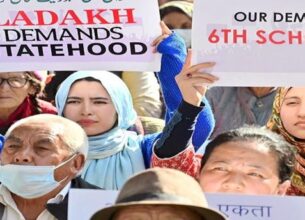Concerns over UT Ladakh
Why in News?
- Sonam Wangchuk claimed that the Centre’s approach was alienating the youth by sowing the seeds of militancy as the demand for the preservation of land, culture, and jobs under the 6th Schedule of the Constitution grew in Ladakh.
What are the concerns raised?
- 12,000 jobs were promised but the recruitment was completed only for 800 positions.
- Common people and journalists were booked for raising their voices in favour of the 6th Schedule.
- Earlier the UT had four MLAs in the State Assembly (J&K) but now has zero representation.
- One man (L-G, who is an outsider) decides everything and 90% of the ₹6,000 crores allocated to Ladakh is at the dispensation of a non-elected person.
Background:
- On August 5, 2019, the erstwhile state of Jammu and Kashmir was stripped of its special status and bifurcated into two Union Territories (Jammu and Kashmir, and Ladakh).
- However, the region’s intellectuals and the politicians have been repeatedly raising concern over the demography, land and unique culture of the Ladakh and are saying the statehood with legislature would be able to give them necessary safeguards.
- In September 2019, the National Commission for Scheduled Tribes recommended the inclusion of Ladakh under the Sixth Schedule.
- The Commission took note of the fact that the newly created Union Territory of Ladakh is predominantly a tribal region in the country.
- The total tribal population in the Ladakh region is more than 97 per cent.
What is the issue now?
- There is a demand to amend the Ladakh Hill Development Council Act, passed in 1997.
- Ladakh needs safeguards for land, employment and cultural identity on the lines under the Sixth Schedule of the Constitution.
- Roles and responsibilities of the central government, the Union Territory administration and the Lieutenant-Governor need to be defined.
- It aims to safeguard the demography, environment and unique culture of Ladakh.
About Sixth Schedule of the Constitution:
- It provides for the administration of tribal areas in Assam, Meghalaya, Tripura and Mizoram to safeguard the rights of the tribal population in these states.
- This special provision is provided under Article 244(2) and Article 275(1) of the Constitution.
- It seeks to safeguard the rights of the tribal population through the formation of Autonomous District Councils (ADC).
- ADCs are bodies representing a district to which the Constitution has given varying degrees of autonomy within the state legislature.
What are its Features?
- Provisions have been made for the creation of the District Councils and regional councils for the exercise of certain legislative and judicial powers. However, their jurisdiction is subject to the jurisdiction of the concerned High Court.
- They have powers to form courts to hear cases where both parties are members of Scheduled Tribes and the maximum sentence is less than 5 years in prison.
- They also have powers to levy taxes, fees and tolls on buildings, land, animals, vehicles, boats, entry of goods into the area, roads, ferries, bridges, employment and income and general taxes for the maintenance of schools and roads.
- The Acts of Parliament or the State Legislature do not apply to autonomous districts and autonomous regions or apply with specified modifications and exceptions.
- The Governor is vested with powers regarding the councils. He/she, by public notification, may:
- Include or exclude any new area.
- Create a new autonomous district.
- Define the boundaries of any autonomous district.
- Increase or decrease the area of an existing autonomous district.
- Alter the name of any autonomous district.
Benefits:
- It was incorporated to protect the rights of the minority tribals living within a larger state dominated by the majority.
- It allows for greater political autonomy and decentralised governance in certain tribal areas of the Northeast.
Issues:
- It undermines the social harmony, stability and economic development of the state and the region.
Way Forward:
- There should be certain clear-cut parameters and safeguards to check the unfettered demands.
- It is better to allow democratic concerns like development, decentralisation and governance rather than religion, caste, language or dialect to be the valid bases for conceding the demands.







